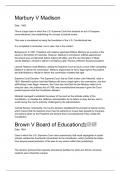Summary
Constitutional Law Summary of legal cases in the United States
- Course
- Institution
In this document, you will find summaries of important legal cases in the US : - Marbury V Madison - Brown V Board of Education - Loving V Virginia - Roe V Wade - Obergefell v Hodges For each of them, you'ill find : - The date - Why is the case meaningful for the US - The background/c...
[Show more]



